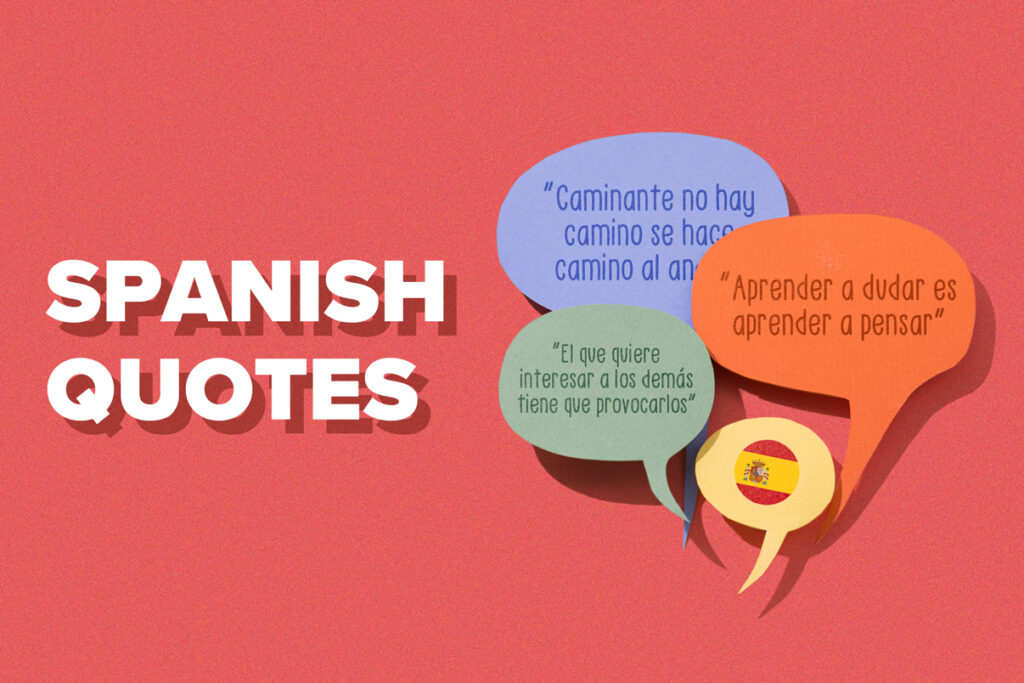
34 Inspirational Spanish Quotes About Life, Love and Everything in Between
Spanish quotes about life contain a lot of wisdom. Maybe it’s something about the Spanish language itself—so ancient, rich and influenced by diverse cultures and tongues.
Discovering Spanish quotes about life’s major issues—like life, death and romance—can refresh your worldview and provide a lot of new inspiration.
That’s why we compiled this post of the most thought-provoking and moving Spanish quotes.
Ready to be inspired?
Contents
- Spanish Quotes About Life
-
- 1. La verdad adelgaza, pero no quiebra
- 2. La libertad está en ser dueños de nuestra vida
- 3. La vida es corta. Vive apasionadamente y siente la felicidad
- 4. Como no me he preocupado de nacer, no me preocupo de morir
- 5. Errar es humano, pero más lo es culpar de ello a otros
- 6. A los tontos no les dura el dinero
- 7. A beber y a tragar, que el mundo se va a acabar
- 8. No dejes para mañana lo que puedas hacer hoy
- Inspirational Spanish Quotes
-
- 9. Enamórate de ti, de la vida y luego de quien tú quieras
- 10. Caminante, no hay camino, se hace camino al andar
- 11. Uno siempre vuelve a los lugares donde amó la vida
- 12. Si la vida te da limones… ¡pide sal y tequila!
- 13. El que quiere interesar a los demás tiene que provocarlos
- 14. Arriesga y haz que tu vida valga la pena
- 15. El hombre que se levanta es aún más grande que el que no ha caído
- 16. No llores porque se terminó, sonríe porque sucedió
- Thought-provoking Spanish Quotes
-
- 17. El arte de vencer se aprende en las derrotas
- 18. El amor todo lo puede
- 19. El tiempo todo lo cura
- 20. Hay que sentir el pensamiento y pensar el sentimiento
- 21. Aprender a dudar es aprender a pensar
- 22. Nunca tendré compasión por los que no supieron morir a tiempo
- 23. La vida es simple, pero insistimos en hacerla complicada
- 24. La lengua no tiene hueso, pero corta lo más grueso
- Spanish Quotes About Relationships
-
- 25. Enamorarse es crear una religión cuyo Dios es falible
- 26. Dime con quién andas y te diré quien eres
- 27. Hoy por ti, mañana por mí
- 28. Por lo que tiene de fuego, suele apagarse el amor
- 29. Tal vez sea verdad: que un corazón es lo que mueve el mundo
- 30. Amar es encontrar en la felicidad de otro la propia felicidad
- 31. Amar no es mirarse el uno al otro, es mirar juntos en la misma dirección
- Spanish Quotes About History
- And One More Thing…
Download: This blog post is available as a convenient and portable PDF that you can take anywhere. Click here to get a copy. (Download)
Spanish Quotes About Life
1. La verdad adelgaza, pero no quiebra
Translation: The truth may be stretched thin, but it never breaks
By: Miguel de Cervantes
Cervantes is Spain’s greatest writer, so it’s a good idea to trust his bits of wisdom. This quote captures the universal nature of truth and its enduring legacy, even in the age of “fake news.”
2. La libertad está en ser dueños de nuestra vida
Translation: Freedom consists of owning your own life
By: Plato
Plato is a giant of philosophy, so you may want to heed these words carefully. Freedom is a lot of things, but unless you know your own life, you don’t have it.
3. La vida es corta. Vive apasionadamente y siente la felicidad
Translation: Life is short. Live passionately and feel happiness
By: Unknown
We all know this is true, even if we don’t act like it all the time. Take this advice. Trust me. Life is short.
4. Como no me he preocupado de nacer, no me preocupo de morir
Translation: Just as I didn’t worry about being born, I’m not worried about dying
By: Federico García Lorca
Just like being born is part of life, so is death. Why would we be worried about the last if we weren’t about the first?
5. Errar es humano, pero más lo es culpar de ello a otros
Translation: To err is human, but even more so is to blame others for it
By: Baltazar Gracián
This quote demonstrates his insight into human nature—the impulse to blame others for our mistakes.
6. A los tontos no les dura el dinero
Translation: A fool and his money are soon parted
By: Unknown
This Spanish quote reminds us to be good stewards of our money and spend it wisely, and people who burn holes through their pockets are foolish.
7. A beber y a tragar, que el mundo se va a acabar
Translation: Drink and eat, the world is going to end
By: Unknown
This saying is a reminder to enjoy life in the present because no one lives forever.
8. No dejes para mañana lo que puedas hacer hoy
Translation: Don’t leave for tomorrow what you can do today
By: Unknown
This quote is about productivity, using your time wisely, and a reminder that procrastination will only lead to stress!
Inspirational Spanish Quotes
9. Enamórate de ti, de la vida y luego de quien tú quieras
Translation: Fall in love with yourself, with life and then with whoever you want
By: Frida Kahlo
If you don’t love yourself and your life, you’ll never find fulfillment in trying to love someone else.
10. Caminante, no hay camino, se hace camino al andar
Translation: Walker, there is no path, you make it as you walk
By: Antonio Machado
This quote means we have to make way on our own for the life we want to live.
11. Uno siempre vuelve a los lugares donde amó la vida
Translation: Everyone comes back to the places where they loved life
By: Unknown
Home is where the heart is, and it’s the same with people. You’re drawn back to those who make you feel best about life.
12. Si la vida te da limones… ¡pide sal y tequila!
Translation: If life is giving you lemons, ask for salt and tequila!
By: Unknown
This funny inspirational quote is from Mexico, where tequila is a helpful mood lifter. But hey: don’t take this one too seriously, just like you shouldn’t with life.
13. El que quiere interesar a los demás tiene que provocarlos
English translation: He who wants to interest others must provoke them
By: Salvador Dalí
No one became famous or remembered by doing things the traditional way and playing it safe.
14. Arriesga y haz que tu vida valga la pena
Translation: Risk and make your life worthy
By: Unknown
You have to go to places and do things that make you feel uncomfortable to have a fulfilling life.
15. El hombre que se levanta es aún más grande que el que no ha caído
Translation: The man who stands up is greater than the one who hasn’t fallen
By: Concepción Arenal
People who fail but keep trying again are already more successful than those who never try.
16. No llores porque se terminó, sonríe porque sucedió
Translation: Don’t cry because it’s over, smile because it happened
By: Gabriel García Márquez
We can choose to be sad that something is over, or we can be happy and grateful for the experience.
Thought-provoking Spanish Quotes
17. El arte de vencer se aprende en las derrotas
Translation: The art of winning is learned through losses
By: Simón Bolívar
You have to take risks and experience loss to really know what winning is.
18. El amor todo lo puede
Translation: Love conquers all
By: Unknown
We all know this saying for its universal message about the power of love. In Spanish, it sounds even more wise.
19. El tiempo todo lo cura
Translation: Time heals all
By: Unknown
No matter what you face or what losses you experience, it gets just a little bit better each day.
20. Hay que sentir el pensamiento y pensar el sentimiento
Translation: You must feel your thought and think your feeling
By: Miguel de Unamuno
Carefully consider your own position and follow your true inner morality wherever it may take you.
21. Aprender a dudar es aprender a pensar
Translation: Learning to doubt is learning to think
By: Octavio Paz
Another quote from Octavio Paz, this quote tells us that doubting isn’t always bad. If you never doubt anything, are you really thinking for yourself?
22. Nunca tendré compasión por los que no supieron morir a tiempo
Translation: I will never have sympathy for those who do not die on time
By: Rodrigo Díaz de Vivar (El Cid Campeador)
Morir a tiempo means “to die when you’re supposed to,” and in this case, “standing up for what you believe in.”
23. La vida es simple, pero insistimos en hacerla complicada
Translation: Life is simple, but we insist on making it complicated
By: Confucius
Slow down and take a deep breath—hardly anything is as severe as we think.
24. La lengua no tiene hueso, pero corta lo más grueso
Translation: The tongue doesn’t have a bone, but it cuts the thickest
By: Unknown
Words are extremely powerful, and what you say can cut deeper than any physical weapon, punch or blow.
Spanish Quotes About Relationships
25. Enamorarse es crear una religión cuyo Dios es falible
Translation: Falling in love is creating a religion whose God is fallible
By: Jorge Luis Borges
If we put all our hope in one person, we’re guaranteed to be let down because no one is perfect.
26. Dime con quién andas y te diré quien eres
Translation: You are the company you keep
By: Unknown
Are all of your friends rich and successful? Well, then it’s much more likely that you will turn out this way, too. Unfortunately, the opposite is also true.
27. Hoy por ti, mañana por mí
Translation: You scratch my back, I’ll scratch yours
By: Unknown
This universal truth by an unknown speaker distills the nature of doing people favors and being generous: it goes both ways.
28. Por lo que tiene de fuego, suele apagarse el amor
Translation: Because of what it has of fire, love usually goes out
By: Tirso de Molina
Spain’s premiere dramatist Tirso de Molina knew that love is powerful stuff, and because of that, it sometimes doesn’t last long.
29. Tal vez sea verdad: que un corazón es lo que mueve el mundo
Translation: Perhaps it is true: it is a heart which moves the world
By: Dámaso Alonso
Meaningful world change starts with the right intentions and a big heart.
30. Amar es encontrar en la felicidad de otro la propia felicidad
Translation: Love is finding someone else’s happiness your own
By: Unknown
This incredibly wise quote by an unattributed author perfectly explains how you need to love yourself in order to love someone else.
31. Amar no es mirarse el uno al otro, es mirar juntos en la misma dirección
Translation: Love is not to look at each other, it’s to look together in the same direction
By: Antoine de Saint-Exupéry
The partner we’ll love forever is someone we can journey through life with.
Spanish Quotes About History
32. Cuando seas padre, comerás huevos
Translation: You’ll understand when you’re older
By: Unknown
Literally: “When you’re a father, you’ll eat eggs.” Time passes and wisdom increases seems to be the main message of this quote. It’s also what your mother tells you when you bug her about some important life issue.
33. La historia nunca dice adiós. Lo que dice siempre es un hasta luego
Translation: History never says goodbye. It only says see you later
By: Unknown
This powerful quote by an unattributed author tells us that history repeats itself, no matter how much we feel we’ve evolved.
34. A lo hecho, pecho
Translation: What is done is done
By: Unknown
Literally: “To what’s done, chest.” Once something has been done, there’s no way back; nothing you can do but to puff your chest and face the new challenges that lie ahead.
These 34 Spanish quotes are more than inspirational—they have the power to teach us meaningful lessons about life.
You can even find hundreds more by paying attention to Spanish media, from telenovelas to novels. Another good place to continue your Spanish quote explorations is FluentU—the language learning program lets you watch Spanish videos paired with learning tools.
FluentU takes authentic videos—like music videos, movie trailers, news and inspiring talks—and turns them into personalized language learning lessons.
You can try FluentU for free for 2 weeks. Check out the website or download the iOS app or Android app.
P.S. Click here to take advantage of our current sale! (Expires at the end of this month)

Just remember, it’s one thing to know Spanish quotes—now it’s time to live them!
Download: This blog post is available as a convenient and portable PDF that you can take anywhere. Click here to get a copy. (Download)
And One More Thing…
If you've made it this far that means you probably enjoy learning Spanish with engaging material and will then love FluentU.
Other sites use scripted content. FluentU uses a natural approach that helps you ease into the Spanish language and culture over time. You’ll learn Spanish as it’s actually spoken by real people.
FluentU has a wide variety of videos, as you can see here:

FluentU brings native videos within reach with interactive transcripts. You can tap on any word to look it up instantly. Every definition has examples that have been written to help you understand how the word is used. If you see an interesting word you don’t know, you can add it to a vocab list.

Review a complete interactive transcript under the Dialogue tab, and find words and phrases listed under Vocab.

Learn all the vocabulary in any video with FluentU’s robust learning engine. Swipe left or right to see more examples of the word you’re on.

The best part is that FluentU keeps track of the vocabulary that you’re learning, and gives you extra practice with difficult words. It'll even remind you when it’s time to review what you’ve learned. Every learner has a truly personalized experience, even if they’re learning with the same video.
Start using the FluentU website on your computer or tablet or, better yet, download the FluentU app from the iTunes or Google Play store. Click here to take advantage of our current sale! (Expires at the end of this month.)













